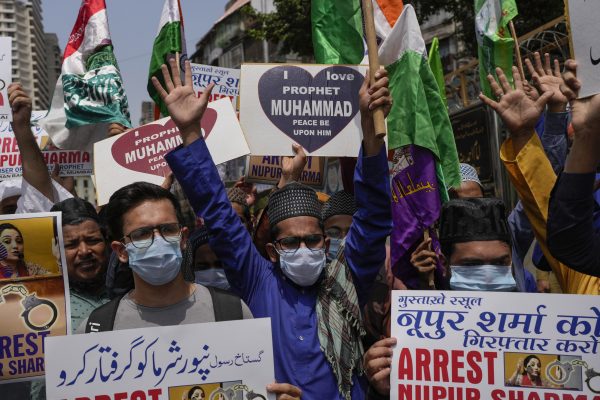
Indian Muslims shout slogans as they react to the derogatory references to Islam and the Prophet Muhammad made by top officials in the governing Hindu nationalist party during a protest in Mumbai, India, Monday, June 6, 2022.
Indian diplomacy is facing an international furor after a spokesperson of the ruling Bharatiya Janata Party (BJP) made derogatory comments about Prophet Muhammad in a televized debate recently. Nupur Sharma, the BJP’s main spokesperson, made the comments during a debate last month while Naveen Jindal, another BJP official, followed up with a tweet about the Prophet. The tweet has been deleted, but the controversy from these comments has created a big headache for Indian foreign policy, at least temporarily.
The incidents led to domestic protests in India. Internationally, a number of Muslim-majority countries in South Asia and the Middle East are infuriated. Countries including Qatar, Kuwait, Iran, Saudi Arabia, Oman, Afghanistan, Indonesia, Malaysia, and Pakistan have characterized the remarks as offensive. The Qatari government, to give one example, summoned the Indian ambassador and stated the “disappointment of the State of Qatar and its total rejection and condemnation to the controversial remarks made by an official in the ruling party in India against Prophet Muhammad.” Qatar has sought an apology from the Indian government, saying that it is engaged in “a cycle of violence and hate.” Kuwait’s government also summoned the Indian ambassador and expressed its “categorical rejection and condemnation of the insulting statements.” Even Oman, traditionally close to India, had a tough reaction to the latest episode, with its grand mufti, Ahmad bin Hamad al-Khalili, expressing disapproval of “the insolent and obscene rudeness of the official spokesman for the ruling extremist party in India against the messenger of Islam.” The Omani Foreign Ministry issued a strong statement, too.
More countries, including the UAE, Jordan and the Maldives, have come out with critical statements. The Gulf Cooperation Council (GCC), consisting of six member states — Kuwait, Oman, Bahrain, United Arab Emirates, Qatar, and Saudi Arabia — which includes some of India’s key strategic partners, has also issued a statement condemning the offensive remarks. The statement noted that the GCC “condemned, rejected and denounced the statements made by the spokesperson of the Indian Bharatiya Janata Party against the Holy Prophet Mohammed bin Abdullah.”
The Organization of Islamic Countries (OIC) also issued a strong statement, though in this case, India responded that “it categorically rejects OIC Secretariat’s unwarranted and narrow-minded comments” urging the OIC “to stop pursuing its communal approach and show due respect to all faiths and religions.” India has had previous run-ins with the OIC, which probably explains this different reaction.
Diplomat Brief Weekly Newsletter N Get briefed on the story of the week, and developing stories to watch across the Asia-Pacific. Get the Newsletter
In addition to condemnation and critical statements, there are online calls in the Middle East for a boycott of Indian goods. #BoycottIndiaProducts and #Stopinsulting_ProphetMuhammad have been trending on social media platforms in various Gulf countries. A Kuwaiti supermarket pulled Indian products from its shelves. The Al-Ardiya Co-Operative Society store, which pulled the Indian products in its store, was also considering country-wide boycott of Indian products, including rice and spices.
Enjoying this article? Click here to subscribe for full access. Just $5 a month.
In an effort at quelling the diplomatic outrage, the BJP finally suspended its spokesperson Nupur Sharma and expelled Naveen Jindal. The BJP thereafter issued a statement saying, “During the thousands of years of the history of India every religion has blossomed and flourished. BJP respects all religions. BJP strongly denounces insult of any religious personalities of any religion. BJP is also strongly against any ideology which insults or demeans any sect or religion. BJP does not promote such people or philosophy.” Bahrain and Oman have publicly noted their appreciation of the measures taken against the two BJP officials.
Given the high foreign policy stakes involved, the BJP was compelled to take action. Top diplomats in many countries in the Middle Eastern region were busy managing the diplomatic fallout. Indian diplomats in many countries had a common response: that the two party officials’ comments “do not, in any manner, reflect the views of the Government of India” and that these were “the views of fringe elements.”
The Indian government had little choice but to try to pacify the Middle Eastern countries. India has an annual trade of $90 billion in 2020-21 with the GCC countries, an important factor in India’s response. Moreover, millions of Indians work in the GCC countries, and foreign remittances worth $35 billion are important too. India’s dependence on the GCC for its energy requirements is another significant factor influencing the Indian response. Many Indian foreign policy analysts had appreciated how skillfully Modi had cultivated the Middle East for its energy security requirements as well as to isolate Pakistan, but it appears that these ill-advised comments may have done some damage, both to Indian foreign policy and Modi’s reputation.
While the damage is unlikely to be permanent or even long term, this episode nevertheless illustrates the danger facing Indian foreign policy from domestic political developments, which is increasingly centered on religious conflicts rather than issues of development or social welfare. This is dangerous for a country like India because its power potential is still only potential, not yet actualized.







